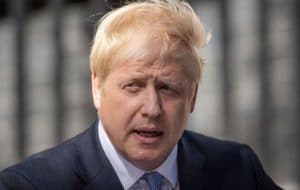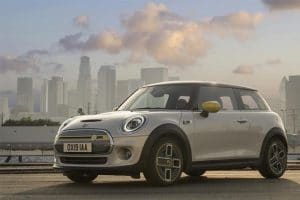
British Prime Minister Boris Johnson is pushing for an end to gas- and diesel-powered vehicles in Britain by 2035.
Great Britain may have left the European Union, but it is continuing to follow a very European-oriented policy on motor vehicle emissions.
Prime Minister Boris Johnson plans to announce that Great Britain will ban the sale new cars using gasoline or diesel engines starting 2035 or five years sooner than previously planned as he kicks off plans for a U.N. climate summit later.
“Hosting COP26 is an important opportunity for the UK and nations across the globe to step up in the fight against climate change,” Johnson said in a statement released by his office ahead of a speech in London on Tuesday.

Johnson’s push to eliminate gas- and diesel-powered vehicles and encouragement of alternative fuels flies in the face of President Donald Trump, a supporter.
“As we set out our plans to hit our ambitious 2050 net zero target across this year, so we shall urge others to join us in pledging net zero emissions.”
Johnson also will call for international efforts to reach net zero as early as possible, including through investment in cleaner technology, preservation of natural habitats and measures to improve resilience to the impact of climate change.
The announcement puts him at odds with one of his major political allies, President Donald Trump, who abandoned the 2015 Paris Accord, and lashed out at the so-called Green New Deal, which is designed to move the U.S. towards wider use of renewable energy rather than fossil fuel as well as the greater use of electric vehicles.
(Exclusive: GM’s next-gen EVs could charge as fast as you can fill an empty gas tank)
The British government said that, subject to consultation, it planned to bring forward an end to the sale of new gasoline and diesel cars and vans to 2035, or earlier if a faster transition was possible. It also said it would include hybrids.

The new Mini Cooper SE will be the British marque’s first all-electric model, and possibly a big seller in Britain as the country moves away from ICE vehicles.
France plans to ban the sale of fossil fuel-powered cars by 2040 while Norway’s parliament has set a non-binding goal that by 2025 all cars should be zero emissions.
Norway has the world’s highest rate of electric vehicle use and in January fully electric e-tron sports utility vehicle was Norway’s top-selling car for the second time in four months, hitting a market share of 9.4%, registration data showed. Overall electric vehicles accounted for nearly 45% of all vehicles sold in Norway last month.
Tesla was the market leader in Norway with 11% market share in what is admittedly a relatively small market.
(Bloomberg would push U.S. to go all EVs by 2035)
Meanwhile diesel and gasoline models still account for 90% of sales in Great Britain prospective buyers of greener models say they worry about the limited availability of charging points, the limited range of certain models and the cost of a new EV.

Call me stupid, but I think this headlong rush to BEVs is going to bite us in the ass. Where’s the electricity going to come from? Where’re the battery raw materials coming from? How are the batteries going to be recycled?